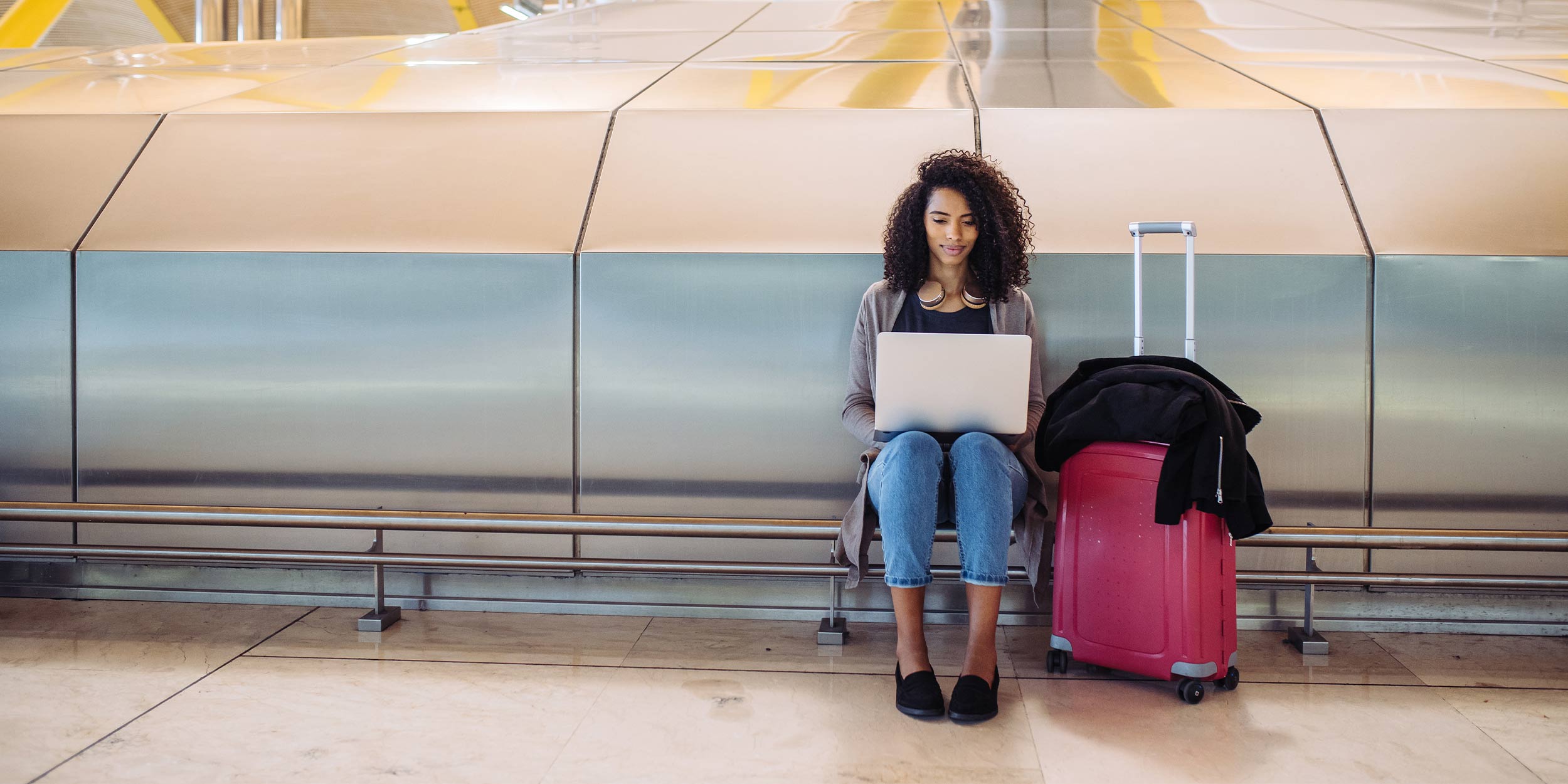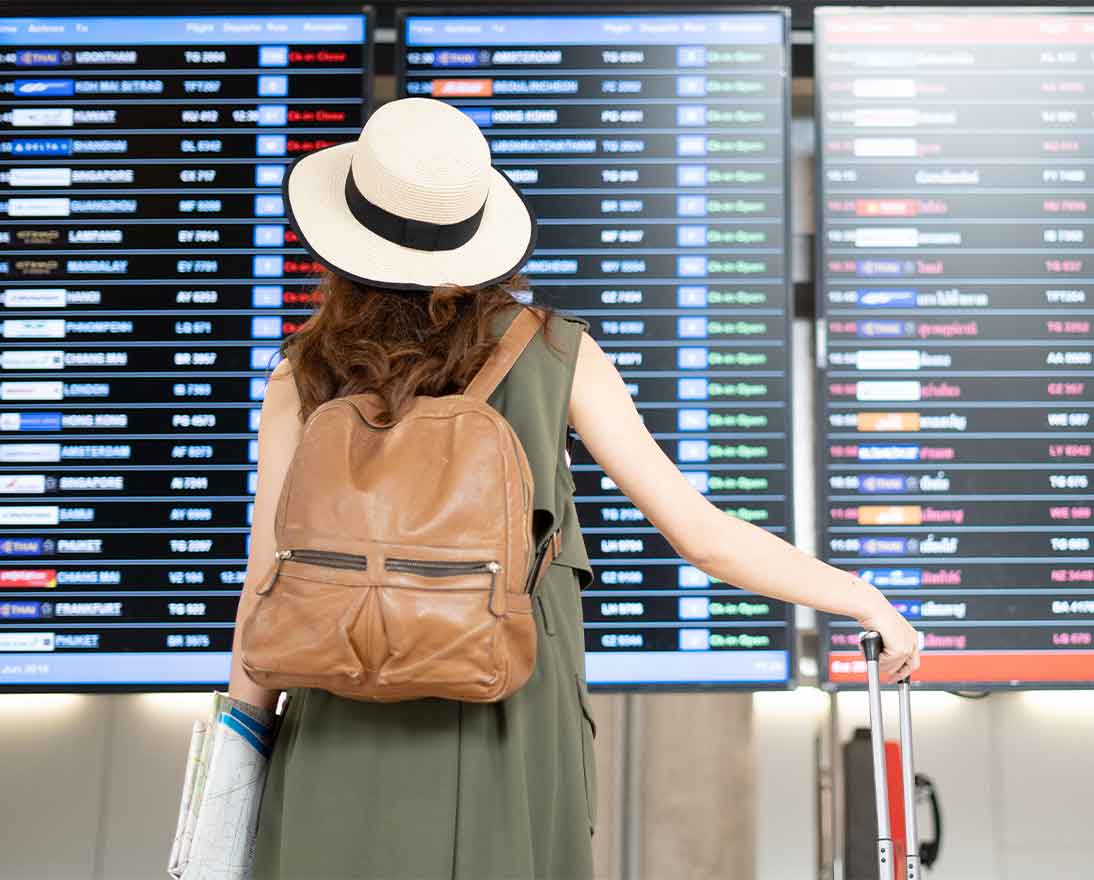5 tips on how women can protect themselves while traveling
RiskArticleMarch 8, 20247 min read
In a recent survey, a majority of women business travelers said they felt it was less safe than traveling as a man. Here are some protective measures that might be helpful, according to the experts at World Travel Protection.
Travel can enlighten, enrich and transform us. To quote the acclaimed Indian novelist Anita Desai, “Wherever you go becomes a part of you somehow.” Or, in the words of writer and intellectual Rebecca Solnit, “When you give yourself to places, they give you yourself back.” So while travel is about learning and discovery – and should be encouraged – women, unfortunately, often have to take extra precautions.
As The New York Times reported in 2019, the number of solo women travelers has increased over the years, but so, too, have unfortunate incidents perpetrated against women. And while numbers are hard to pin down, the article stated the following: “There’s no question that women face unique risks when traveling solo, experts say.” The piece also quoted Phumzile Mlambo-Ngcuka, Executive Director of UN Women, an organization that promotes gender equality, who told the NY Times: “We have evidence that shows that women face risks that men don’t face in public spaces, at home, wherever they may be.”
The U.S. State Department even has a page on its website with detailed, practical recommendations specifically for women travelers. And last year, World Travel Protection – a subsidiary of Cover-More, which is part of Zurich Insurance Group – commissioned a survey on safety to 2,000 business travelers in Australia, Canada, the US, and the UK. The findings were sobering. Seven in 10 women business travelers felt that traveling for work as a woman is less safe than traveling as a man, while 31 percent don’t travel or go out at night on their own, compared to 18 percent of men.
According to the survey, 46 percent of women keep their family and friends informed of their whereabouts (compared to 36 percent of men). More than a third of women (36 percent) also said they didn’t like traveling to countries where women’s rights weren’t protected, compared to only 15 percent of men. In addition, 10 percent have had a women’s health problem while traveling but didn’t seek help because of lingering stigmas around women’s health issues, and 12 percent of women have had a negative experience, from theft to assault.
Kate Fitzpatrick, EMEA’s Regional Security Director at World Travel Protection, says the number of sexual assaults she deals with is “unbelievable,” adding that “it’s shocking and saddening how many cases of sexual assault we deal with. These people are often severely traumatized, and our overriding priority is to ensure that they’re safe and out of harm. Our medical team will also be heavily involved in ensuring their health and welfare, including support to visit a local hospital.”
So with travel – business and otherwise – nearly back to pre-pandemic levels, and with major events like the Paris Olympics and the European Football Championships in Germany this year, consider the following safety tips for women from World Travel Protection. In a nutshell, always stay vigilant, which is sound advice for all travelers, too.
Tip 1. Research (research and more research)
World Travel Protection recommends: “Before booking your trip, check your government’s latest travel advice for your destination. And book accommodation and airport transfers in advance, particularly if traveling to a place where you don’t speak the native language well.”
Kate says: “It’s important to note that, compared to men, women often have different safety considerations to think about when traveling for work. The risk will generally increase in countries with less equality. It’s essential, therefore, that women have a full understanding of the cultural norms in their destinations, from what to wear to how they act. We often undertake specific risk assessments for women business travelers to make sure their safety and security is the highest priority.”
Tip 2. Be especially alert while on transport
World Travel Protection recommends: “Travel in official taxis or an app-based rideshare and sit in the back seat. Keep your luggage close to you while on buses and trains. Sit near other women and avoid empty carriages. Don’t hitchhike.”
Kate says: “Often criminal groups work the unlicensed taxis and look to exploit the inexperienced traveler. Before getting into a vehicle, ask to see their license and identification. If the taxi driver cannot provide their license, do not get in the vehicle. Unlicensed taxis can present many threats to a visitor, such as being assaulted, mugged, held under duress and driven to an ATM to withdraw money – and on very rare occasions kidnap and murder. If it does not look right and does not feel right, do not get in.”
Tip 3. Think (and act) like a local
World Travel Protection recommends: “Be aware of common scams in your destination so you know what to look out for. Try to look like a local where possible to avoid sticking out or attracting unwanted attention. Carry a travel bag that slings across your body, rather than a backpack or loose handbag. Don’t tell people you are traveling alone – if asked, pretend you are meeting someone. Join group tours and organized activities to meet other like-minded solo travelers. Check in regularly with friends and family and ensure someone has a copy of your itinerary and knows where you will be. Share your location from your phone whenever possible.”
Kate says: “Of course it sounds obvious but don’t flaunt your valuables when you’re away. Don’t take that expensive watch or ring on business trips. It just makes you a walking target for a petty, opportunist thief. Leave items of value in a hotel safe when you can and take the minimum that you need out.”
Tip 4. Remember, women’s health differs around the world
World Travel Protection recommends: “Sanitary products and contraceptives may be difficult to purchase in some countries. It’s a good idea to stock up on supplies and medication before you leave.”
Kate says: “Tampons can be hard to come by in some countries, and their use can be frowned upon. We always advise women to stock up on sanitary products and take them with you, as you don’t know what you’ll be able to source on the ground. Also, if you’re questioned about tampons in your luggage, respond politely and calmly, as you might come across ignorance and hostility in some areas of the world.”
Tip 5. Avoid too much alcohol or drugs
World Travel Protection recommends: “Be careful not to drink alcohol in excess or take drugs that could impair your judgement or compromise your ability to maintain your senses or general awareness. It’s important to understand that different countries have differing moral and social standards and making yourself vulnerable may unnecessarily expose you to greater risks of harm. Avoid alcoholic drinks that are being sold from market stalls or any unlicensed setting. Check labels of alcoholic drinks. If in doubt, do not drink it.”
Kate says: “And depending on where you are, you might want to avoid drinking in public. So again, make sure you’re thoroughly briefed on your destination, try not to draw attention to yourself and keep your wits about you. Crucially, ensure you have the emergency contact details of your assistance provider programmed into your phone, and if they offer an app, like the Travel Assistance App provided by World Travel Protection, make sure this is activated on your phone. [On Google Play and Apple.] Then if the worst does happen, you can know where to get help, and we can locate you quickly and easily. But look, I’ve traveled all over the world for years, and it has made for some of the best experiences of my life, so I definitely encourage women to travel.”
Photos: Top, Adobe Stock; center (Kate Fitzpatrick), World Travel Protection.



